by @sf2
As EOS takes it's first steps over the last few weeks many issues with the constitution, vote distribution, the worker proposal system and referendum contract needed to fix many of the problems people are complaining about have become painfully apparent. We are not focusing enough on educating and activating the token holders AKA - the users of the EOS network, nearly enough.
If we expect to change the things we don't like about the system, we have to help make them a lot more palatable than what we have been serving up to the general public.
That starts with a user-centered approach to EOS voting.
Unifying The Four Houses of Voting
After many hours of research into the Referendum Contract, Worker Proposal and Proxie Voting groups, and listening to hundreds of users complain, one thing became apparent...
We were only making it harder for our users to interact with the EOS blockchain in a way that would produce the outcomes the ecosystem at large wanted to see.
More Telegram groups. More complexity. More engineer dominated discussions that failed to address the needs of the majority of token holders complaints...
Is there a safe EOS wallet to use?
When will a hardware wallet be ready?
What do I do to recover my token if they have been phished, lost my key or didn't register?
How should I vote?
Why should I vote?
Where should I vote?
Who should I vote for?
Only in the last few weeks have some of these questions been answered to the vast majority of token holders. With less than 30% of the total token supply staked, it is pretty obvious we need to focus on answering these questions and providing a neutral place for everyone to come together.
But There Are So Many of These Resources, Why The Confusion?
I believe it's a variety of reasons and no one persons fault, but rather all of our fault.
A hyper-competitive environment where BPs only want to send people to their branded tools
Other BPs not wanting to cross promote others tools as much as they could for fear of losing votes
A lack of qualified UX / UI talent willing to put in the work for the betterment of the network
An engineer dominated culture that doesn't always prioritize usability as much as they could (or are short on #3)
Some key infrastructure that overlooked prior to the mainnet launch (WPS, Referendum Contract, etc...)
There are other factors as well, but those are some of the main areas I think contribute to the current environment.
The Elephant in the Room
Currently, there are 3 separate groups working on...
Identifying trusted, objective proxies and activating token holders to delegate their vote (to combat voter apathy) and help improve vote distribution in the top 49 nodes
Completing the referendum contract to change the things in the EOS system people are unhappy about
A forum to have discussions about governance issues on-chain (not in Telegram) and have the outcomes of those discussions turn into referendum or a worker proposal (if necessary)
A means to tally votes on potential referendums worker proposals
My issue is that creating a dozen different interfaces, conflicting information and the ephemeral nature of the communication channels we are using only compound the confusion for the average token holder, especially at this early phase.
We need to keep things as simple as possible and unify our efforts, at least until we have activated more token holders to stake their EOS on the network and have educated them on how the system works.
It has been my position for some time that the complexity of EOS is overwhelming to the typical crypto enthusiast.
We as a community forget that we might as well be speaking Klingon for the vast majority of token holders, and we should move forward in the coming months with a keen understanding of that in everything we put our time into.
Come Together, Right Now
As many may know (or may not know) I was part of the EOSPortal.io community initiate that contributed to unlocking the chain. After doing some thinking on this unique design problem, I realized that a step in the right direction would be to...
Combine the Voter Proxy, Referendum Contract and Worker Proposal groups under one unified effort
Spend as much time and resources as we can to educate and activate token holders about how and why it is important to use these systems if they want to see EOS improve and evolve
Remove any and all of the typical BP branding you see on these portals and projects to shut down voter bias and encourage every BPC/BP operation across the globe to share the resource to as many token holders as possible
What That Would Look Like
After some thought and a few iterations, I have created a few mockups to share my vision with the EOS community and solicit feedback from all the brilliant minds who have made this chain what it is so far.
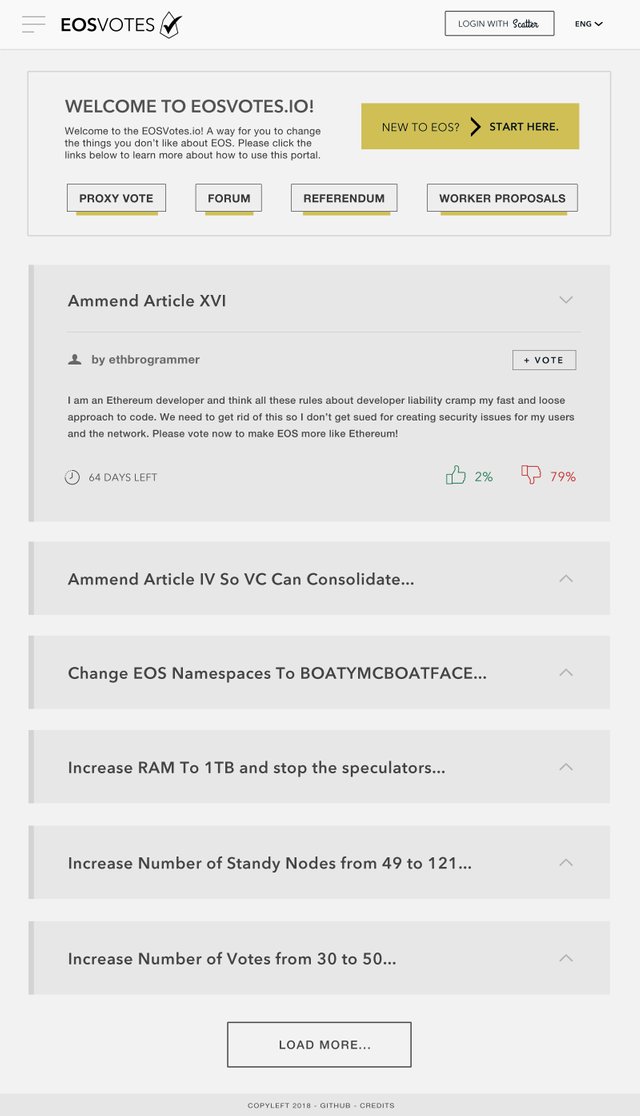
A simple means for token holders to vote on referendums.
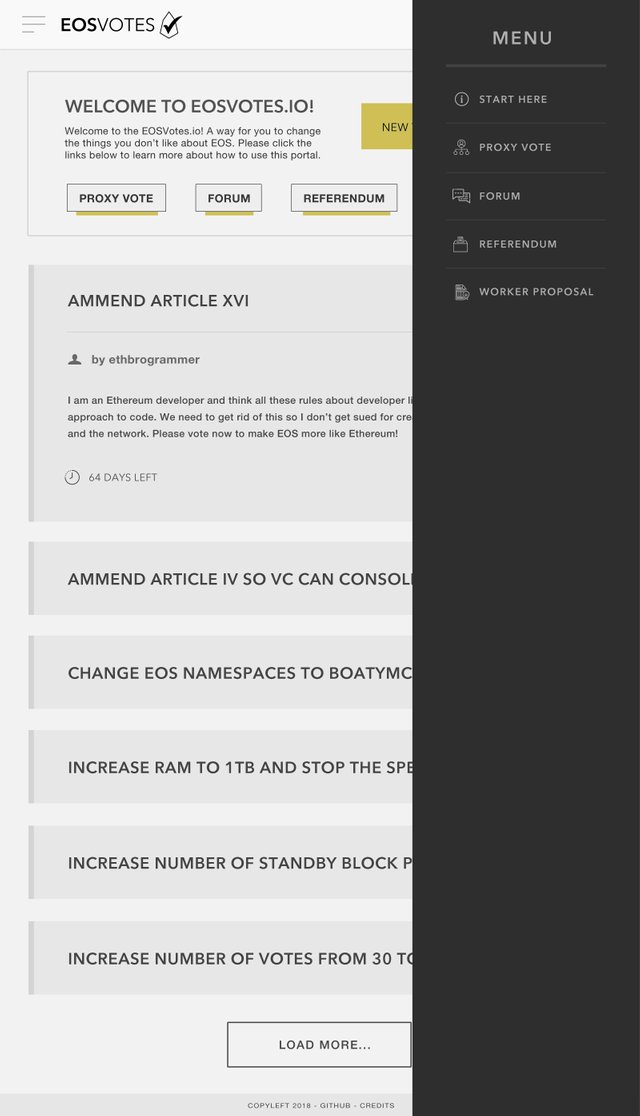
A flyout menu that connects all of the components needed to get people to interact with these features.
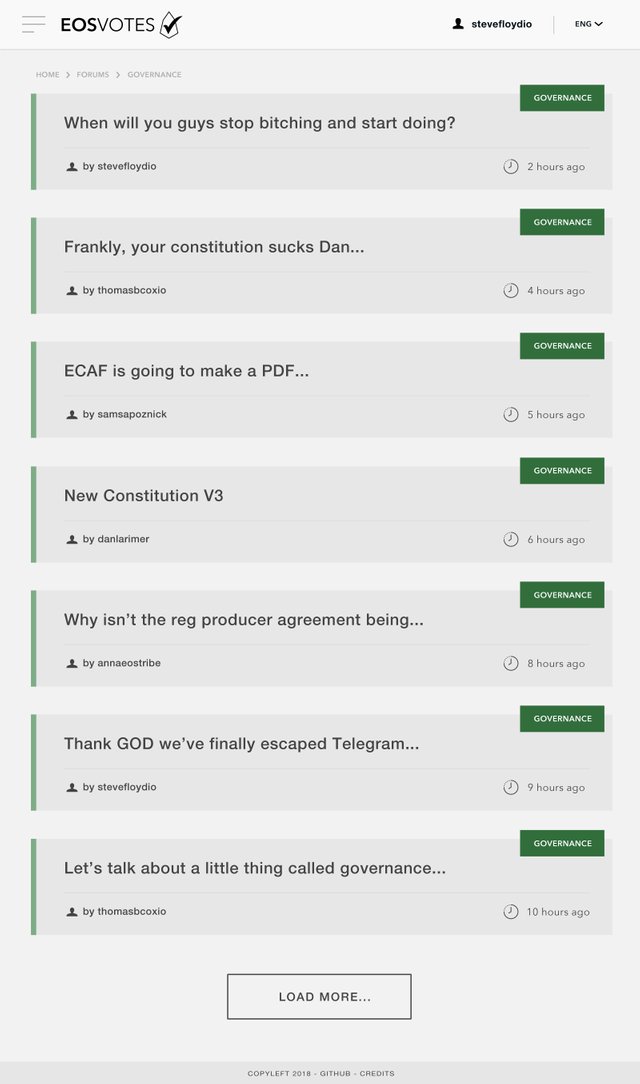
A forum to discuss things that matter to the community on-chain.
EOSVotes.io Is Coming!!
Special thanks to Denis Carriere and Daniel Keyes of EOS Nation, as well as Sukesh Tedla of EOS Green for their work in the Referendum Contract group. They have all been supportive of this idea and there will be some more on the progress of this in the next week or so.
Connect With Us
- Website - https://eostribe.io
- Github - https://github.com/eostribe
- Telegram - http://t.me/EOSTribe
- Facebook - https://www.facebook.com/groups/eostribe
- Twitter - https://twitter.com/eostribe
- Medium - https://medium.com/eostribe
- Discord - https://discord.gg/Su7pDGt
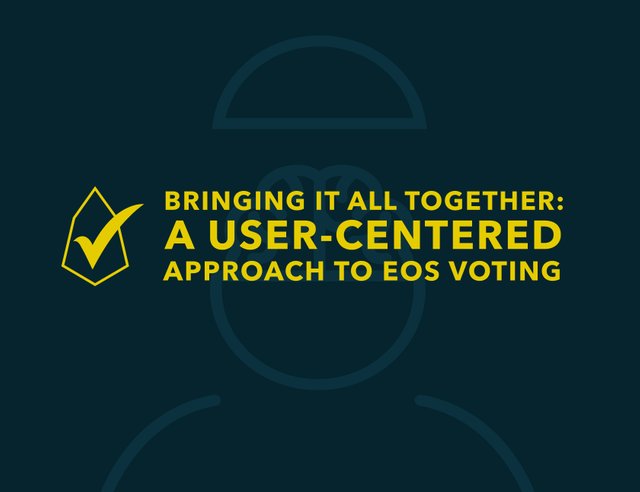
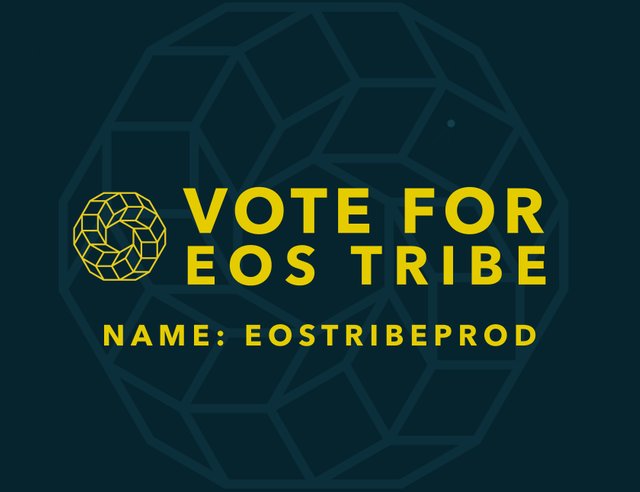
Breath of fresh air ... the system at its core is far too complex: CPU, network and RAM ... in Steem all this is decided by staked tokens. Bandwidth exists sure, but it is solely a product of SP and you only see it on a block explorer, or if the network is clogged and you don't have enough. I expected EOS to be just as user friendly and accessible as Steem, but EOS is needlessly complex by design and this is a HUGE barrier to widespread adoption.
Downvoting a post can decrease pending rewards and make it less visible. Common reasons:
Submit
This is why I joined the Tribe, Steve's leadership in helping to educate and drive mass adoption through good design thinking, UX & visual design. I believe this is one of the most important things we can focus on in the community. Great job.
Downvoting a post can decrease pending rewards and make it less visible. Common reasons:
Submit
Scatter is a bit hard to set up (no go for a non-techie) but once it works, it works easy. Just like MetaMask.
In about a year’s time, we will have plenty of tools available that make it easier for non-tech people to enter the EOS field. But I realise that crypto is still early, very early.
Downvoting a post can decrease pending rewards and make it less visible. Common reasons:
Submit
Agreed. We need a solution like steemconnect. Scatter is great, but just like RAM, CPU and Network, it seems like a needless layer of complexity.
Downvoting a post can decrease pending rewards and make it less visible. Common reasons:
Submit
This is brilliant Steve. I’ve always maintained that the biggest hurdle for mass adoption of crypto (not only EOS) is simplicity. All other hurdles come second to that. Unless it becomes Steve-Jobs-simple and appealing, we won’t be seeing mass adoption.
Downvoting a post can decrease pending rewards and make it less visible. Common reasons:
Submit
I agree with you that there is a lot of confusion out there. My personal opinion is that a lot of the issues are because people are lazy. I think the group should agree on one voting tool moving forward, but it is amazing how many people are just so passive about the whole thing. They didn't bother to register their tokens and haven't been following along and now want someone to step in and do the work for them or just tell them what to do. I am basically a crypto noob, but I have been able to figure things out. The Greymass voting tool is very easy to use. Don't you think it will be harder for those smaller BP's that haven't yet gotten the name recognition to be voted in if branding went away? I am just afraid some really good groups and project would get cast to the wayside. I guess the same thing is already happening with branding, but my question is how do you fix that?
Downvoting a post can decrease pending rewards and make it less visible. Common reasons:
Submit
Yep I think we have a real issue here about how the smaller BPs are able to sustain themselves in the current environment to provide the checks and balances against the block votes of the whales
Downvoting a post can decrease pending rewards and make it less visible. Common reasons:
Submit
EOS is becoming a protocol. It's not like other cryptocurrencies. Speculators who don't understand this are confused, but that's to be expected. If application developers are confused, that's more concerning. I'm quite comfortable with many different portals and approaches, I just think it would be helpful to provide more directories explaining what all the tools are, what they do, who built them, if they are trustworthy, etc. I don't think centralizing things is the answer. I think the answer is having more tools like Google or Bing or DuckDuckGo. In many ways, we're building a new, decentralized Internet here and it's only 1995 or so. The answer to me isn't to move too quickly to get a "faster horse" (what Ford suggested many people wanted) but instead provide something new. Something better. Something decentralized.
I'd love for every day users of EOS to not really know anything about EOS. It'll all be under the hood of the applications they are using.
I'd like to see BPs become trusted community partners for those who do care more about the protocol itself (serious investors, dapp developers, businesses, etc). A handful of trusted BPs then become the gateway for them to learn more and stay informed. I think that model provides a nice level of decentralization and healthy competition. If a given BP isn't meeting the needs of those who are requesting information from them, other BPs are available to compete.
Downvoting a post can decrease pending rewards and make it less visible. Common reasons:
Submit
well said, EOS is unique, it is being built in the open, so suffers more criticism than any other project, but it's strength is being open to change more than any other
seems to me, communities emerging and cooperating on a scale I've never seen, and it is a beautiful thing to see happening,
and those who want an easy user experience are likely the users of dapps further down the road, who don't need to be aware of how EOS works
Downvoting a post can decrease pending rewards and make it less visible. Common reasons:
Submit
That's not really what this is about at all @lukstokes. Completely agree with your perspective on this in the big picture, just not so much in the short term. There is a huge knowledge gap we need to fill and that's all this proposal is about. Just like EOS Portal was necessary to unlock the chain, this is just a place to explain what the heck all this stuff is while those other tools are being built. A temporary stop gap at most.
There will be many wallets, interfaces, portals, directories, etc... but until those are built and there is more liquidity flowing through the network for people to build those things, we can come together and do something to move the referendum contract forward.
I think any attempt to reduce friction for users should be seen as a good thing during these phases, as nothing will move or change (constitution, etc...) until someone takes action and puts in the time and money.
At these early phases many of us have very little of either. We can sit back and complain about what others are doing to take action and get things moving, or we can do something, anything - even if that doesn't fit the perfect version of what some define as the true spirit of DPoS.
We shouldn't be too harsh at these early attempts to get things kickstarted as this new protocol takes it's first steps. All systems go through a phase of centralized approaches before they can function sustainably in a decentralized fashion. Look at nature, business, humanity, etc...
It's all part of the process.
Downvoting a post can decrease pending rewards and make it less visible. Common reasons:
Submit
I think we need patience and perspective. Professional software always goes through alpha and beta testing before the expectations set on it are realized. We're just barely in the beta phase, and I think we should adjust our expectations accordingly. Moving fast isn't the primary goal. Doing things right is.
I think we should be rationally critical if:
because:
teaches us that once an organism (or organization) is brought into being, it's primary goal is to remain in existence. Once we create any forms of centralization it's very, very difficult to go the other direction to decentralization. The ABP approach is what launched the chain, and it was done in such a way as to provably show how it could be disbanded via removing keys with all powers completely removed. In essence, the ABP was killed and no longer exists. Until I see forms of centralization take a similar route to ensure they don't morph into something terrible, I will continue to raise my concerns.
The United States, as an example, started as an amazing economic experiment. A minarchy with very little centralization. It thrived. It has now become the largest centralized global military power the world has ever known. The original document of the constitution could not prevent this. We should learn from this history and take things slow while educating all our users how important this is to get right. There are no shortcuts to the process, unless we sacrifice principles.
That said, I'm all about moving as quickly as we can while making user interfaces easier and more secure. This is like the Internet in 1995 or so. There's a lot of work to be done and "the last mile problem" hasn't been solved yet. Biometrics, time locks, and more will help people secure their private keys. From there, we'll have a foundation to build on. Worker proposals done right will allow more funds to flow to build great things. It will take some time. We're all working incredibly hard and sacrificing quite a bit of sleep. Progress is being made. We need patience and accurate expectations.
Saying we can all agree on one way of doing things, one standard reminds me of this XKCD comic:
Those with experience in these things won't waste the time trying something that won't work in decentralized systems.
Downvoting a post can decrease pending rewards and make it less visible. Common reasons:
Submit
Your arguments are based on some assumption that this will be the only portal / place for these things to happen. @greymass, @generEOS, @eostribe and many others are also building wallets, web based portals and interfaces for people to interact with the referendum contract and cast votes.
The nodeos plugin that Greymass proposed and the existing methods of tallying votes would leave us in limbo for 2-3 months or more at a time where some areas of the constitution need to be ratified and adjusted for the ecosystem to move forward.
No standard is being forced on anyone - one proposed method to get things moving has, but people are free to do whatever they want to integrate eos.forum as they see fit and tally votes from the referendum contract.
I have fought the idea that only one account can interface with the contract in the short term publicly long before you chimed here or in the forum post on EOS Go (and have taken a lot of flack from those working on the referendum).
Don't try to give the readers here the perception that you have the moral high ground on this issue when I was the very first one to speak out and try to get people to rally against it. Those are the facts.
I am doing everything I can to push the people developing the referendum contract away from only having one account that can approve referendum. Maybe helping me present and argue those points, rather than DPoS virtue signaling in the comments on a proposal post for one UI solution, and actually contributing your time to steer this in a more decentralized direction would be a better use of your time?
I mean, if you really actually cared about the outcome of this and weren't just positioning yourself in the public debate. Just saying homie.
Downvoting a post can decrease pending rewards and make it less visible. Common reasons:
Submit
I'm not virtue signaling, and we've spent enough time in direct one on one conversation for you to hopefully know that. I'm pointing out inconsistencies in the approach as I see them:
Does not match up with:
Whenever there's a proposal which says, "Hey everyone, we should all do it my way" then I'm going to start asking tough questions and voicing my concerns. A single UI solution (or at least some strong consistency within UIs) could be helpful, but I also see the huge benefit of choice and competing approaches and designs and building loyalty within token voters and the block producers they trust.
My comments were not about the referendum. If you want to talk about that, then link me to a formal discussion, and I'll contribute if I can. We're barely a month into EOS Mainnet existing. A few months to do things right doesn't seem like the wrong approach.
Maybe it would be helpful for me to better understand what you mean by:
Downvoting a post can decrease pending rewards and make it less visible. Common reasons:
Submit
"A way to change the things you don't like about EOS" sounds awfully negative. Can you phrase this a bit more constructively?
Downvoting a post can decrease pending rewards and make it less visible. Common reasons:
Submit
We were merely documenting the sentiment we see in the community, no need to self censor or sugar coat it.
Downvoting a post can decrease pending rewards and make it less visible. Common reasons:
Submit
FEEDBACK:
I really like the "New to EOS? | Start here". Don't need to tell them why 'Scatter' is good. Just do it! It's been tested. Everyone uses it. Process streamlined for new people, so the learning curve greatly reduced and not 'huntin' the internet for the key information, like some puzzle. It's damn stressful, judging by many comments seen on different TG groups and Discord servers.
+1 Agree: Must be built for humans. Regular, everyday humans ;). Essential for successful adoption mainstream, globally. :D
My 10 EOS worth. Thanks for creating and sharing.
Downvoting a post can decrease pending rewards and make it less visible. Common reasons:
Submit
Oh almost forgot: #3: Education. Education outreach programmes. Online Education tutorials read and click tutorials, with immediate feedback Q's and A's? no longer than 5-10 minutes each key module? (What would be deemed/considered essential knowledge?). My Grandma's attention span isn't that great...;) Just saying.
Downvoting a post can decrease pending rewards and make it less visible. Common reasons:
Submit
Hello Steve great post EOS UK support this initiative. I was just saying in an interview the other day that i thought we needed 'an interface', a single place where end users can interact with the EOS Blockchain, so maybe this will be it. Now we just need to find a way to get the buy in of ALL BPs (Paid, Standbys and Candidates). If we want to suggest features, usability updates and donate developer resources to the project what is the best way to go about getting involved?
Downvoting a post can decrease pending rewards and make it less visible. Common reasons:
Submit
https://coggle.it/diagram/W0F2zA8lImvcLT1X/t/bringing-it-all-together/d53ab498fe8a52f8983b0297ee8df1fed79f9cc1ec662052a5fd63d8eac4eaef
A chart with the major points and concerns brought up by your document.
Downvoting a post can decrease pending rewards and make it less visible. Common reasons:
Submit